Staying united through all shows strength of China-Pak bond
Over the years, many facts have proved that China and Pakistan are true friends and good brothers that share weal and woe.
As more countries have come together to fight the COVID-19 outbreak, a common enemy of mankind, Pakistani President Arif Alvi has visited China for the first time since he assumed office in 2018, showing the determination of the two all-weather friends to forge a closer community with a shared future.
While Pakistani volunteers stayed in China to fight the novel coronavirus, a team of Chinese experts traveled to Pakistan to tackle a locust crisis. As Chinese President Xi Jinping told Alvi on Tuesday in Beijing, "Facts have proved once again that China and Pakistan are true friends who share weal and woe and good brothers who share each other's joys and sorrows."

Chinese President Xi Jinping holds talks with Pakistani President Arif Alvi at the Great Hall of the People in Beijing, capital of China, March 17, 2020. [Photo/Xinhua]
Firm support
As Xi recalled, at the beginning of the epidemic, Alvi wrote him a letter to convey consolation, and Alvi's latest trip marks his firm support. The Pakistani side also offered everything within their capabilities to provide China with anti-epidemic materials.
In addition to the governmental support, during the ongoing COVID-19 outbreak, many Pakistanis have remained in China to help their "second hometown."
"I knew in my heart that I had to stay here with my Chinese brothers and sisters, because throughout my life in China, I have received a lot of love from the Chinese, and it was the first chance in my life to make a little contribution to China," said Abdul Zahir Hamad, a Pakistani who studied medicine in China and later became a professional doctor.
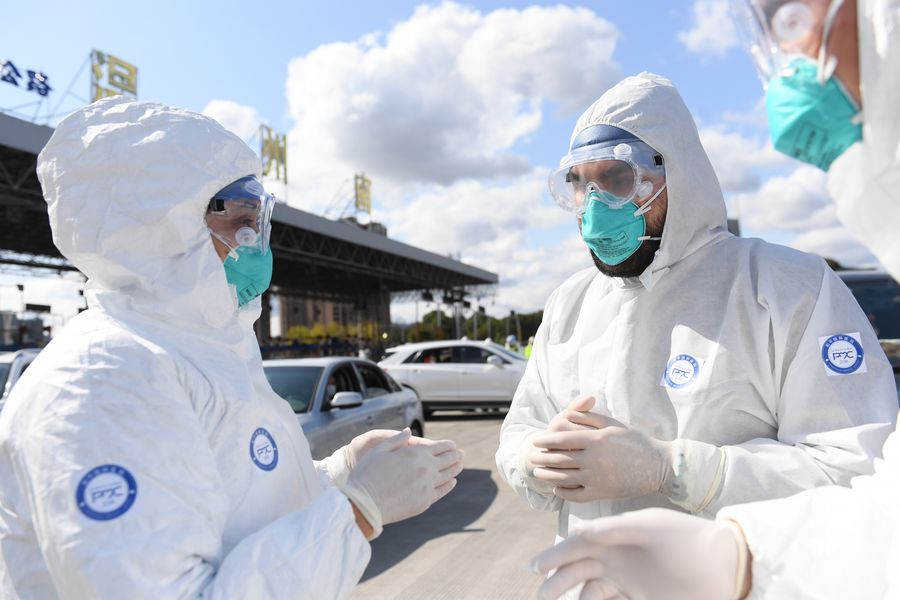
Pakistani Abdul Zahir Hamad (R) works at a highway exit checkpoint in Wenzhou, east China's Zhejiang Province, Feb. 8, 2020. [Photo/Xinhua]
After the outbreak of the novel coronavirus, Hamad had a chance to return to Pakistan. However, he chose to stay with his Chinese colleagues and volunteered to help at a highway exit checkpoint in Wenzhou, a city in China's eastern Zhejiang Province, taking temperatures of drivers and passengers.
"I grew up here, I completed my education and started my career here, and after spending more than a decade in China I feel it's my second home. It took care of me like a mother does," Hamad told Xinhua in a recent interview.
The young Pakistani doctor's affection for China can be traced back to his father. "Friendship with China is incarnated in the soul of every Pakistani, even when our children are young, we tell them that China is our best friend," Hamad's father told Xinhua.
"He made the right choice to stay and serve our dear friends who always stood up for our country and supported us whenever we needed them," the father said, despite his fears over the virus.
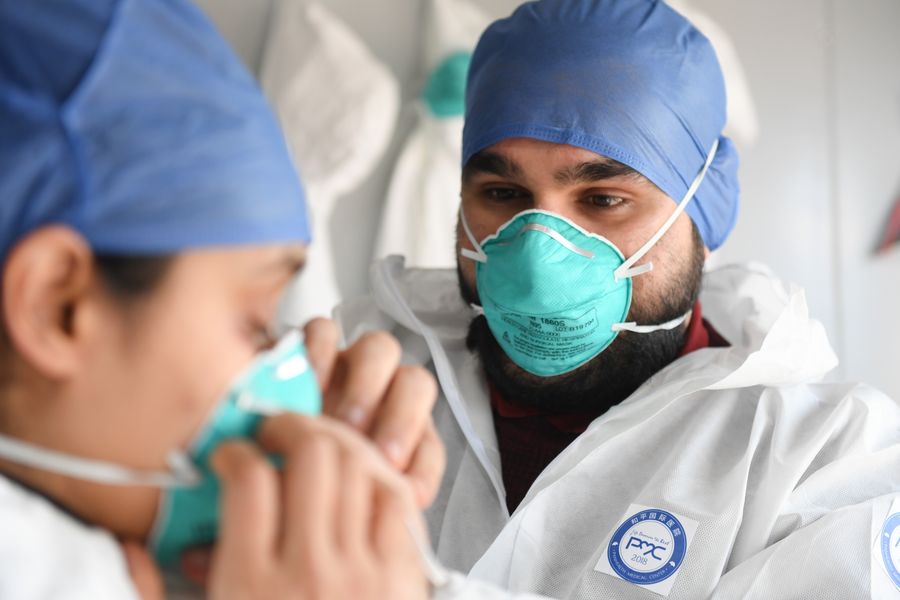
Pakistani Abdul Zahir Hamad (R) makes preparation before getting into work at a highway exit checkpoint in Wenzhou, east China's Zhejiang Province, Feb. 8, 2020. [Photo/Xinhua]
True friendship
In Alvi's words, Pakistan and China are ironclad brothers who can go through thick and thin together, and the two peoples feel deep amity toward each other and the bilateral friendship becomes even firmer as time goes by.
China's assistance to Pakistan in handling its locust crisis is another stellar example. In Khushab, in the central Pakistani province of Punjab, Chinese entomologist Zhang Long kneeled on the sandy ground, carefully searching for desert locust eggs.
Zhang, from China Agriculture University, together with other top Chinese experts on locust control, arrived in Pakistan last month to help the south Asian country to fight its worst desert locust attack in 27 years.

Chinese expert Zhang Long searches for desert locust eggs in Khushab, Punjab province, Pakistan, March 2, 2020. [Photo/Xinhua]
Zhang and his team traveled thousands of miles to conduct field surveys in the provinces of Sindh, Balochistan and Punjab, where swarms of desert locusts laid eggs, and worked out a comprehensive plan with their Pakistani counterparts to tackle the locust crisis.
The locust swarms led to a 15-percent reduction in crop production in the affected areas, causing a loss of more than 100 billion Pakistani rupees (about 627.3 million U.S. dollars), according to Mubarak Ahmad, the Food and Agriculture Organization of the United Nations' national locust control coordinator in Pakistan.
"We came here to help our Pakistani brothers control the locusts. Pakistan also extended a hand when we were suffering the epidemic," said Wang Fengle, chief expert of the Chinese team.
Last week, the first batch of locust control supplies provided by the Chinese government, including 50,000 liters of malathion and 14 air-powered long-range sprayers, arrived in the Pakistani port city of Karachi.
"Chinese experts have offered new hope to farmers, because they are confident that China's assistance will enable them to save their crop," said Syed Miran Muhammad Shah, president of Sindh Chamber of Agriculture.
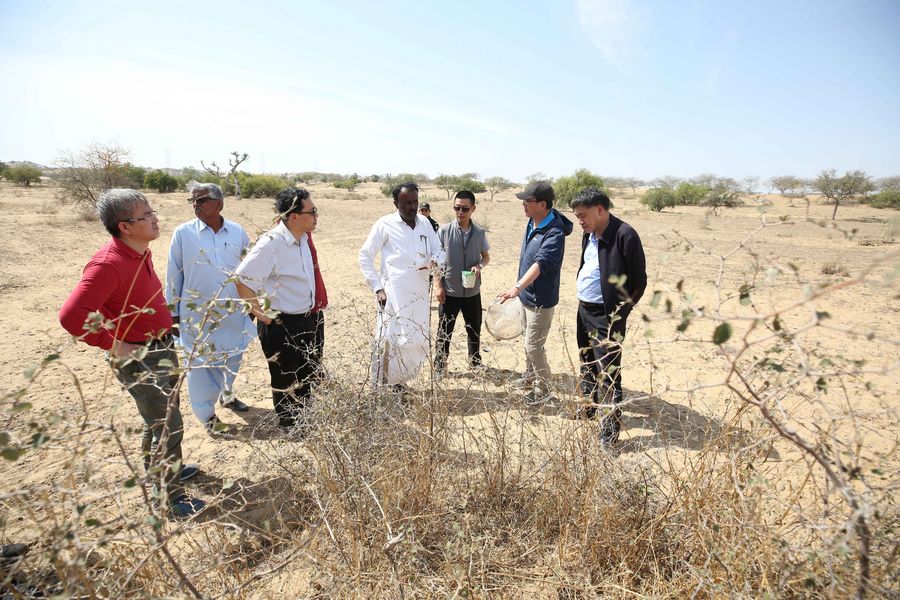
Chinese experts talk with local locust control staff in Tharparkar desert of Sindh province, Pakistan, Feb. 26, 2020. [Photo/Xinhua]
Shared future
"No matter how the international situation changes, China will always stand firmly with Pakistan, and is committed to deepening the ironclad China-Pakistan friendship, so as to make China-Pakistan relations a model for building a community with a shared future for humanity, and better benefit the two peoples," Xi said.
During their talks, the Chinese president also called on the two sides to build the China-Pakistan Economic Corridor (CPEC) into a model of high-quality development within the Belt and Road cooperation.
In the past five years, the CPEC has completed its first phase of upgrading Pakistan's infrastructure, freeing the country from blackouts and connecting its north and south with modern highways.
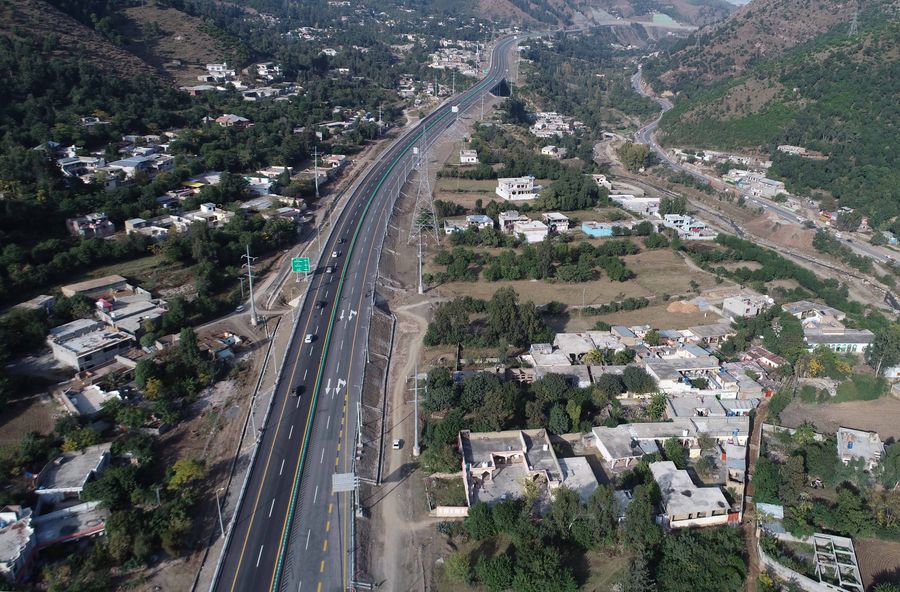
Photo taken on Nov. 18, 2019 shows the motorway section of the Karakoram Highway second phase project in northern Pakistan. [Photo/Xinhua]
Chinese Ambassador to Pakistan Yao Jing told Xinhua on Friday that amid the ongoing global pandemic, it is very necessary to enhance bilateral cooperation in the health sector within the framework of the CPEC, adding that China has planned to donate 300,000 face masks, 10,000 protective suits and 4 million U.S. dollars to Pakistan to fight the disease.
It is a chance for the two countries' healthcare authorities to work together more closely, Shimail Daud Arain, head of Maryam Memorial Hospital of Pakistan, told Xinhua, adding that "China has already helped by providing testing tools, but I think it's time for technical experts to share their experiences."
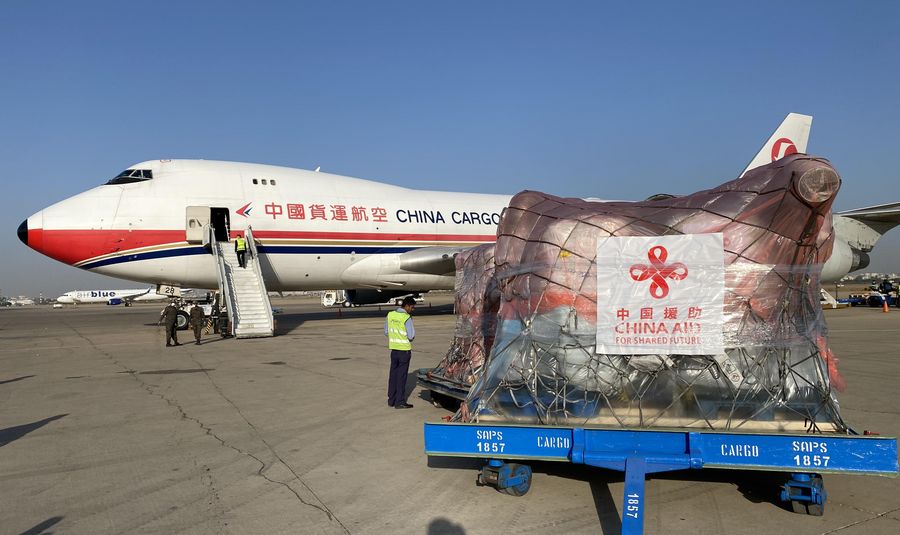
Photo taken on March 9, 2020 shows the first batch of China-aid locust control supplies arriving in Karachi, Pakistan. [Photo/Xinhua]
Friendship is deeply rooted in the exchanges between China and Pakistan, especially when the two countries are in difficulties, Yao said, adding that with the Pakistani president's visit to China and after going through the epidemic, bilateral relations will move towards a closer community with a shared future.

